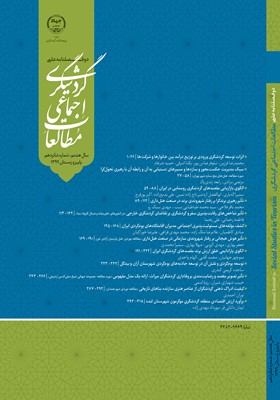سبک مدیریت حکمت محور و سازه ها و مسیرهای دستیابی به آن و رابطه آن با رهبری تحول گرا (مورد مطالعه: هتل های پنج ستاره شهر تهران)
محورهای موضوعی :
1 - کارشناسی ارشد مدیریت MBA دانشگاه پیام نور
کلید واژه: مدیریت حکمت­, محور#رهبری تحول­, گرا#تجربه#معنویت#احساسات#دانش,
چکیده مقاله :
در ادبیات مربوط به حوزه مدیریت و سازمان یکی از موضوعاتی که اخیراً مورد توجه قرار گرفته است، مدیریت حکمت محور است که با مباحث مختلفی از جمله رهبری تحول گرا بی ارتباط نیست. پژوهش حاضر، با هدف بررسی پیشایندهای مدیریت حکمت محور و نقش آن در رهبری تحول گرا انجام شده است. پژوهش از لحاظ هدف، کاربردی، از لحاظ ماهیت و روش، توصیفی- پیمایشی از نوع همبستگی است. برای تست فرضیات، از یک پرسش نامه 50 سوالی طبق طیف استفاده شده است. جامعه آماری پژوهش، مجموعه مدیران و کارکنان هتل های پنج ستاره در شهر تهران به تعداد 800 نفر است؛ حجم نمونه 260 نفر بر اساس جدول کرجسی و مورگان، به روش طبقه ای نسبی، انتخاب شدند. پایایی با استفاده از ضریب آلفای کرونباخ و اعتبار سازه با استفاده از نرم افزار لیزرل و از روش تحلیل عاملی تأييدي بررسی شد. به منظور تجزیه و تحلیل یافته ها از نرم افزار لیزرل و مدل تحلیل مسیر و برای تحلیل متغیر میانجی از آزمون سوبل استفاده شد. نتایج پژوهش حاضر نشان داد که چهار متغیر تجربه، معنویت، احساسات و دانش تأثير معنادار و مثبتی بر مدیریت حکمت محور و رهبری تحول گرا دارند. مدیریت حکمت محور نیز، تأثير معنادار و مثبتی بر رهبری تحول گرا دارد و نقش میانجی گری را بین عوامل ذکرشده و رهبری تحول گرا ایفا می کند. مدیریت حکیمانه می تواند از طریق آموزش و تلاش، با ایفای نقش یک رهبر در سازمان، بر کارکنان خود نفوذ کرده و حکمت را از طریق مسیرهای تجربه، معنویت، احساسات و دانش کسب و به آن ها منتقل نمایند.
In the literature on management and organization, one of the topics that has been considered recently is wisdom-based management, which is not unrelated to various topics, including transformational leadership. The present study aimed to investigate the antecedents of wisdom-based management and its role in transformational leadership. The research is applied in terms of purpose, descriptive-survey in terms of nature and method. To test the hypotheses, a 50-item questionnaire by spectrum was used. The statistical population of the study is 800 managers and employees of five-star hotels in Tehran; The sample size of 260 people was selected based on Krejcie and Morgan table by stratified relative method. Reliability was assessed using Cronbach's alpha coefficient and structural validity was assessed using Lisrel software and confirmatory factor analysis. In order to analyze the findings, LISREL software and path analysis model were used and to analyze the mediating variable, Sobel test was used. The results of the present study showed that the four variables of experience, spirituality, emotions and knowledge have a significant and positive effect on wisdom-based management and transformational leadership. Wisdom-based management also has a significant and positive effect on transformational leadership and plays a mediating role between the mentioned factors and transformational leadership. Wise management can, through training and effort, influence its employees by playing the role of a leader in the organization and acquire and transmit wisdom to them through the paths of experience, spirituality, emotions and knowledge.
